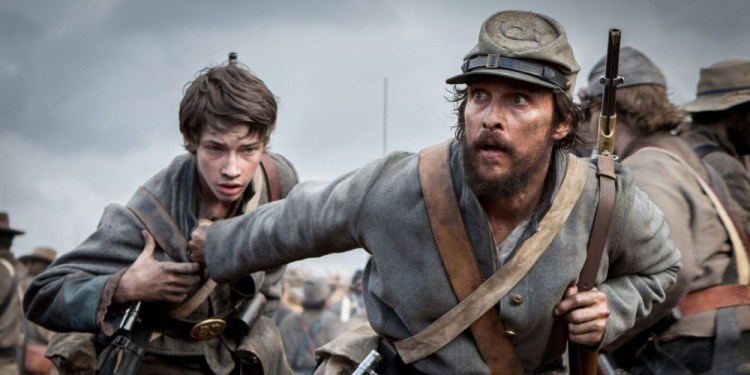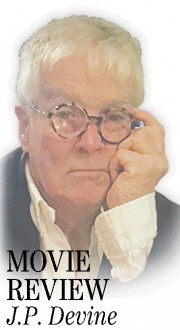“The past is never dead, it’s not even past.”
— William Faulkner
Director and writer Gary Ross is here to give us a much needed history lesson, full of anger and remorse, violence and passion, but framed in a story that glows in stark truth, all these years after the Civil War.
“Free State of Jones” is based on the life of a Mississippi dirt farmer, Newton Knight (Matthew McConaughey in another strong performance), who is one of the rag tag Confederate soldiers caught up in the daily blood baths of the deep South.
Knight, a Confederate “dog” soldier, a man of the South, of the earth, of his people, a man of small education but a huge sense of honor and truth, has been assigned in his company as a medic, bringing in the living, hauling out the dead.
When a young boy from his town dies in his arms, Knight decides he has had his fill. He deserts, and takes the boy’s body back to his mother in Mississippi.
On the run, not particularly welcome back home, and with a price on his head as a deserter, Knight hides out in the swamps with a band of runaway slaves.
Incensed by the corruption of Southern politics that favors the rich slave owners and robs the poor farmers to fill their own stomachs, Knight the farmer emerges as Knight “Robin Hood,” with the swamp as his Sherwood Forest. He forms a scrubby army of other dissidents, black and white, who oppose the rape of their land by Confederate pillagers from other Southern states.
The story covers background around the Civil War with details that have heretofore not fully been revealed.
Newton Knight has not been a major figure of that bloody era, nor the story of that revolt. It involved courageous slaves and whites, among them, a slave, Moses (Mahershala Ali), an antecedent of the marchers of the 50s, who goes forth after the end of the war to raise signatures to allow blacks to vote. Like those who followed him, he comes to a bad end. On a country road in a deserted field, he is ambushed by white men. Knight finds him hanging from a tree, and the flame inside his heart roars to a blaze.
There is a stirring scene, among dozens in this powerful film, toward the end, when Knight leads an armed band of blacks and whites to the court house, to cast the first-ever black votes.
One of Newton’s followers from the first days in the swamp is Rachel (Gugu Mbatha-Raw), a bright, young black woman who practices native medicine and acts as kind of shaman to the slaves.
Having not seen his first wife for years, Knight partners with and has a child with Rachel.
Interspersed throughout the film are scenes in a 1940s Mississippi court room, where Newton Knight’s great-grandson, Davis Knight (Brian Lee Franklin) is being tried and subsequently jailed for marrying a white woman, when traces of his great-grandmother Rachel’s blood are found in his. It’s a stirring reminded that Faulkner’s words are still true.
Gugu Mbatha-Raw’s Rachel and Mahershala Ali’s Moses are two beautifully fashioned pieces of work that stand out among a stunning cast of hundreds of authentic performances. Benoit Delhomme’s camera seeks out and illuminates director Ross’s actions, and Nicholas Britell’s score floats like perfect wind from bloody scenes to tender touches with great skill.
Director Ross, with writer Leonard Hartman’s stirring film, succeeds brilliantly in kicking up the ashes of a once great fire, one almost forgotten, that burned in the swamps of Mississippi. It reminds us that a hundred years later, not far from that swamp, the bodies of James Chaney, Andrew Goodman and Michael Schwerner, the spiritual great-grandchildren of the slave Moses, were found buried in a landfill. To borrow the words of the recently deceased Holocaust hero, Elie Wiesel, “Never Forget.”
J.P. Devine is a former stage and screen actor.
Send questions/comments to the editors.




Success. Please wait for the page to reload. If the page does not reload within 5 seconds, please refresh the page.
Enter your email and password to access comments.
Hi, to comment on stories you must . This profile is in addition to your subscription and website login.
Already have a commenting profile? .
Invalid username/password.
Please check your email to confirm and complete your registration.
Only subscribers are eligible to post comments. Please subscribe or login first for digital access. Here’s why.
Use the form below to reset your password. When you've submitted your account email, we will send an email with a reset code.